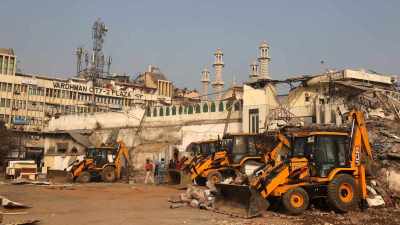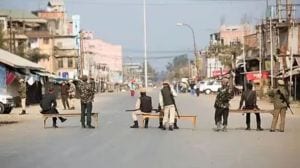Mirage Musharraf
Things have quietened down in Pakistan a bit, and there is some sense of comfort particularly in world capitals where concern...

Things have quietened down in Pakistan a bit, and there is some sense of comfort particularly in world capitals where concern about Pakistan generally hangs heavy. These include Washington and New Delhi. And what is the source of this comfort? That events of the last week have shown that when the chips are down, the Pakistani army is always around. That it is an institution that provides Pakistan stability and, surprise of surprises, moderation. It is fighting fundamentalists in the west, and cleaning up its act in the east bordering India. Further, that Ashfaq Pervez Kiyani, the new army chief, is a moderate. He speaks little, and has made no secret of his aversion to soldiers getting caught up in politics. So far, so good. But what is the subtext?
That somehow it is politicians who are responsible for the mess in Pakistan. They are the ones to have brought it instability, religious extremism, anger on its streets and fear in the minds of its friends.
Now it is vital to question this dangerous presumption that an army can be a force for moderation, stability and modernism whereas popular politics must be its opposite 8212; although that presumption has been made in the past from Turkey to Algeria though, significantly, mostly in countries with an Islamic majority. But that is not the significant issue here. The important issue is the most obvious corollary of this presumption, that, therefore, popular politics is the opposite of all this and, further, that the future of Pakistan would remain secure if political, 8220;elected8221; leaders continue to function under the army8217;s overall supervision. This is another version of guided democracy, and with elections now expected on February 18, it seems to have international endorsement. The world feels much safer with Musharraf, with Kiyani in his side-car, than with some lesser known character from Pakistan8217;s messy politics. Musharraf and his generals are to be trusted more with the nukes, with their control over the ISI and its dropouts and rogue elements, with their promises, and with their commitment to a modern, forward-looking, even pro-West which, ironically, also suits India now Pakistan.
This takes me back to a heated discussion at one of the track II meetings that were common in the more contentious years of India-Pakistan relations. Since these meetings, between Indian and Pakistani analysts, retired and sometimes serving generals and diplomats, followed Chatham House rules, it is not fair to name names or dates. But at one of these, I asked a very distinguished group of Pakistanis why they accorded such a privileged place to their army in their power structure? The answer was prompt: the army keeps our country together, and your guys away from our territory. Without the army 8212; and its predominant place in the power structure 8212; there will be no guarantee of preservation of either our national interest, or our territorial, or ideological frontiers.
My argument that facts and history established exactly the opposite did not quite cut ice. Not only was this almighty army unable to prevent the dismemberment of Pakistan into two halves in 1971, it actually contributed to that calamity. This was a blow to both the territorial and ideological integrity of Pakistan as, with the majority fighting to win a separate nation, the Bangladeshis had questioned the very basis of the two-nation theory. Further, if territory was so important, did Pakistan now have more, or less, of Kashmir than it was left with when ceasefire was called in 1948? The same army had lost it Siachen, and also territories in Kargil and beyond, that India nibbled in 1971. So what exactly had the army contributed that it deserved such an exalted, revered, domineering position in Pakistan8217;s society and politics?
It had, meanwhile, destroyed all of Pakistan8217;s institutions, from the constitution to the judiciary, the civil society, and, to some extent, the media. It had talibanised its polity by running two jihads simultaneously along its western and eastern flanks, had built a rogue nuclear programme that gave Pakistan a bad name around the world and had unleashed forces that threatened not only their own country, but the world at large. This is besides the fact that the armed forces ate up a bulk of Pakistan8217;s resources, cornered some of the most important civilian jobs and yet never won, forget a war, even a skirmish of any size against clumsy, slovenly, civilian India.
It is time again now to raise these questions, and destroy the myth of Pakistan8217;s army having been such a beacon of modernism, such a pillar of stability. That is unfair to millions in a reasonably modern nation that now sees a new democratic yearning. Yes, the Pakistani army is a brilliant, disciplined fighting force, respected by its adversaries. Indian generals are the first to concede that. They will tell you with some awe how no Pakistani soldiers fled, how they fought to the last man, even counter-attacked when dislodged at Kargil, against the heaviest odds. But even the greatest professional army cannot claim an eternal, institutional right to governance and power. In any case the use-by date on such notions is over. That is why the election of February 18 will, at best, be a semi-final, and will bring a more decisive transition later, in its wake.
At this point I must mention a short letter of protest I just received from the Pakistan High Commission, complaining that The Indian Express and particularly this writer were using nasty language about their leaders.
The truth is, we are much tougher on our own leaders but they have the thick skin of politicians. I can8217;t argue that they listen to criticism any more than the soldiers, or change their ways. But they are more tolerant. So really, this paper has never meant to be disrespectful to leaders 8212; military or civilian 8212; or another country.
There are two more letters, from regular readers. One asks for evidence for the mention in one of my earlier columns of some declassified documents that showed the Americans had identified Ayub as a future ruler of Pakistan many years before he actually took over. The other asks if the Pakistani army acquired its pre-eminent position in the power structure sort of coincidentally, or was it by design? Here are a few facts.
There is telling correspondence in Foreign Relations of the United States, 1955-57, Vol VIII on South Asia, pages 412 to 481. A despatch from Horace Hildreth, the then US ambassador in Pakistan, describes the then prime minister, Mohammed Ali, as a weakling and Ayub, then army chief, 8220;the final arbiter of the destiny of cabinets.8221; This note is dated August 26, 1955. Just about five weeks later, in another cable the US counsel-general in Lahore records a fiery conversation where Ayub says he 8220;stands to lose his trousers8221; if the Americans do not deliver on their promises and goes on to advise that 8220;we should strengthen Ayub8217;s position in Pakistan8221; and goes on to suggest that on his forthcoming visit Assistant Secretary Allen 8220;reassure Ayub8221;. And all this a full seven years before Ayub became President.
The answer to the second question would require many books on Pakistan8217;s political history. But please allow me to quote my all-time favourite, from Stephen Cohen8217;s remarkable work, The Pakistan Army Oxford University Press. He quotes 8216;A Prayer8217;, a piece of stirring verse from the American Civil War, issued by the Pakistan brass to all its units in 1978-79. Like much of revolutionary literature, it is inspirational, a call to honour, to 8220;Tall men, sun-browned, to live above the fog8230;8221; But Zia8217;s headquarters was careful to omit the last four lines of the original:
For while in the rabble, with their thumb-worn creeds,
Their large professions and their little deeds, Mingle in selfish strife, lo! Freedom weeps, Wrong rules the land, and waiting Justice sleeps!
If Zia it is that designed the Pakistani army8217;s ideological foundation, he at least knew what he was thinking about. He also knew what to edit!
sgexpressindia.com
- 01
- 02
- 03
- 04
- 05






























